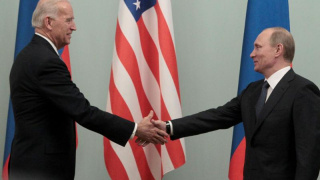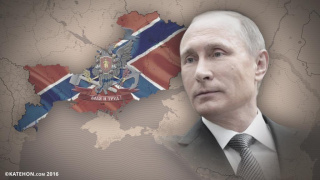How the Badinter Commission on Yugoslavia laid the roots for Crimea’s secession from Ukraine
Generally regarded as the basis of the post-Cold War territorial settlements, the Arbitration Commission of the Conference on Yugoslavia (referred to as the Badinter Commission after its chairman Robert Badinter) separated territoriality from ethnicity and made the internal borders of Yugoslavia the borders of the successor states: a principle initially accepted by the former Soviet Union and its successor states. But Bosnia could not be held within the principles and Kosovo was a direct contradiction of them, not to mention Abkhazia, South Ossetia and Crimea.
The strains of keeping within Badinter have revealed inherent difficulties in dispensing entirely with the ethnic principle as a territorial concept, not least by the constitutional judges who made up the Arbitration Commission. They endorsed cultural nationalism, encouraged a significant degree of political self-determination, and legitimated identity nationalism as a genuine aspiration of peoples. Crimea, with borders, a separatist movement, a denial of identity rights and a recognised right to autonomy, is as much a child of Badinter as a breakaway from it.
The Badinter Commission and Crimea
The Badinter Commission was established by European Community foreign ministers in 1991 to arbitrate among ‘relevant Yugoslav authorities’ in the impending break-up of Yugoslavia. Its opinions, issued between November 1991 and January 1992, served effectively as the peace treaty that ended the Cold War in Europe. At its heart was the separation of territoriality and self-determination from the ethnic principle.
The territorial principle was expressed in Opinion 3, in response to the question: ‘Can the internal boundaries between Croatia and Serbia and between Bosnia and Herzegovina and Serbia be regarded as frontiers in terms of public international law?’ The Commission determined that, ‘except where otherwise agreed, the former boundaries become frontiers protected by international law’, basing its decision on two principles: respect for the territorial status quo and, ‘in particular. . .the principle of uti possidetis’, which endorsed colonial boundaries.
But the territorial settlements after the First World War involving the dissolution of three empires (and the closest approximation to a precedent for the post-1990 situation in Europe) had displayed very little regard for internal borders. That Badinter felt uncertain in applying the principle is demonstrated by the judges immediately moving on to give a constitutional justification, calling on the second and fourth paragraphs of Article 5 of the Constitution of Yugoslavia (in which each republic respected the borders of the others). It also endorsed the ‘tough’ version of uti possidetis – no change of territory at all.
When Croatia declared its intention to separate from Yugoslavia, it did so by appealing to the right of self-determination, echoed by Chancellor Helmut Kohl in granting recognition to Croatia. The right to self-determination appears in the United Nations Charter, article 1.2 of which extends the right of self-determination to all peoples. (Other sources, such as the Declaration on the Granting of Independence to Colonial Countries and Peoples, refer to colonised peoples only.) However, the Charter does not define what is to be understood by the word ‘peoples’, or how their right is to be exercised. The Badinter Commission took the view that ‘in its present state of development, international law does not make clear all the consequences which flow from this principle’.
The critical statement is Opinion 2, issued in response to the question: ‘Does the Serbian population in Croatia and Bosnia-Herzegovina, as one of the constituent peoples of Yugoslavia, have the right to self-determination?’ The Commission substituted the term ‘communities’ for ‘peoples’ and assigned to such communities rights within existing states, recognising ‘that within one State, various ethnic, religious or linguistic communities might exist’ and stated that all such communities have the right to see their respective identities recognised and to benefit from ‘all the human rights and fundamental freedoms recognised in international law, including, where appropriate, the right to choose their national identity’.
The link between self-determination and human rights was made explicit in paragraph 2, in which the Commission called on the two 1966 international covenants on human rights. By this association, and a corollary of it, a people must have the right to determine its own fate in order for individuals to have the right to determine theirs. In Opinion 4, it authorised the referendum as a final test for separation.
But law was by no means the final arbiter of the post-Cold War settlements, at least not in the area of guaranteeing the rights of ‘communities’. Scant attention was given to the Albanian minority in Macedonia or the Serbs of Bosnia, and Croatia was not given a clean bill of health by the Council of Europe until 2000. Neither Estonia nor Latvia made concessions on granting citizenship rights to Russian speakers, provoking formal complaints by Russia to the Council of Europe.
On the territorial side, the western powers were forced to amend their determination on ‘first layer down’ in drawing new borders for, and in authorising full powers to the Republika Srspka, in Bosnia, in 1995 and to depart from it entirely in their recognition of Kosovo in 2006, provoking Russia to recognise Abkhazia and South Ossetia two months later, and on similar grounds, of a ‘remedial right’.
Despite their condemnation of Russia’s ‘annexation’ of Crimea, the Crimean case followed on from Abkhazia and South Ossetia and all three followed closely the Badinter ‘template’. All three were autonomous provinces with clear borders; none belonged by tradition to their respective predecessor states; all could defend separation by referendum (and by degrees of repression); all were ‘peoples’ within their territories and not ‘minorities’. All had great power backing.
The conclusion of Asborn Eide, long-term member of the UN Sub-Commission on the Promotion and Protection of Human Rights and drafter of numerous reports on the protection of minorities, seems the fairest: ‘When a group living together compactly in a geographical region or enclave… claims that it is a people rather than a minority’, and when ‘neighbouring States and/or the international community react in ambiguous ways to such claims, or even endorse them, the future status of that territory is thrown into uncertainty’.






